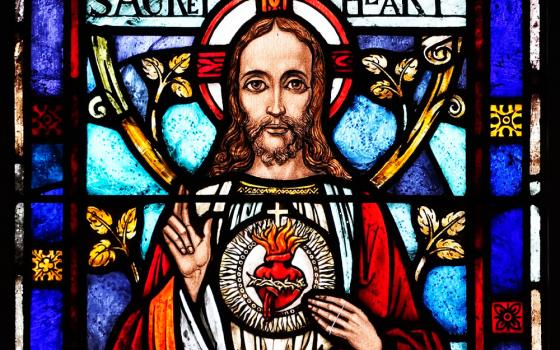St. Paul VI is pictured next to Carmelite Sr. Lucia dos Santos, one of the three Fatima visionaries, during a visit to the Marian shrine in Fatima, Portugal, May 13, 1967. (OSV News/Courtesy of Diocese of Brescia)
In accordance with new Vatican norms on alleged supernatural phenomena, an Italian bishop has given his "nihil obstat" acknowledging the pastoral and spiritual value of devotion to Our Lady of the Mystical Rose of Montichiari and allowing for any eventual pilgrimages to related sites in his diocese.
Bishop Pierantonio Tremolada of Brescia issued the decree July 8 after the Dicastery for the Doctrine of the Faith told him it did not find anything that directly contradicts church teaching in the writings of the late Pierina Gilli, who claimed to have received messages from a series of Marian apparitions in 1947 and 1966.
"The faithful are authorized to give (the phenomenon) their adhesion in a prudent manner," the bishop wrote in his decree. However, the decree is not a declaration recognizing the supernatural origin or character of the alleged events, and the faithful are not obliged to believe in them, he added.
While the devotion to Our Lady of the Mystical Rose is worldwide, Tremolada said his decree applied to his diocese and that, according to the new norms, each bishop should evaluate and decide what is pastorally prudent in his own diocese after consulting with the dicastery.
As of early July, the Vatican's doctrinal office had published two statements or letters concerning specific cases of alleged apparitions and revelations since new norms were released May 17 to help bishops proceed more quickly and carefully in the discernment of alleged supernatural phenomena.
Advertisement
The first was a statement issued June 27 in which the dicastery verified the judgment of Bishop Marco Salvi of Civita Castellano who declared in March that alleged apparitions in Trevignano Romano, Italy, were not supernatural. The dicastery also confirmed the bishop's prohibition of devotions and pilgrimages in places associated with the alleged events in his diocese.
The new norms require bishops to discern alleged supernatural phenomena in dialogue with his national bishops' conference and to send his judgment to the dicastery for input and approval.
The norms also allow bishops to reach one of six conclusions that do not require any certainty about the supernatural authenticity of the phenomenon itself.
In the letter to Tremolada dated July 5, the prefect of the dicastery, Cardinal Víctor Manuel Fernández, said the main purpose of the norms was no longer to establish the supernatural character of alleged phenomenon but to come up with a "doctrinal-pastoral evaluation" based on "the fruits" of the devotion.
The dicastery gave its doctrinal judgment of the messages compiled by Gilli to support the bishop's own discernment, thereby allowing the bishop to issue his own decree.
The cardinal said the dicastery "found no elements in the messages circulated by Pierina Gilli that directly contradict the teaching of the Catholic Church on faith and morals. Neither do we find negative moral aspects or other critical issues in the facts connected with this spiritual experience."
He listed a number of "positive aspects that stand out in the messages as a whole and others that, instead, deserve clarification in order to avoid misunderstandings."
But, "we can argue that the spiritual proposal that flows from the experiences narrated by Pierina Gilli in relation to Our Lady of the Mystical Rose does not contain theological or moral elements contrary to the doctrine of the Church," the cardinal said.







